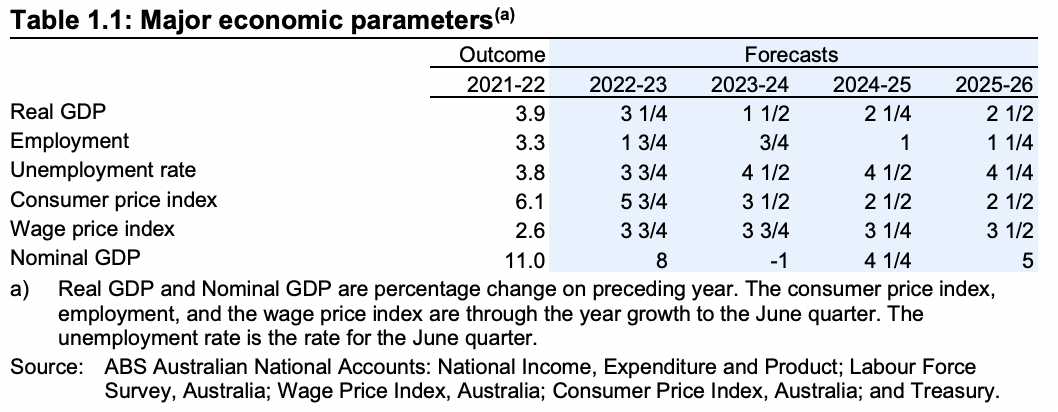What does "a bread and butter" Budget mean for your portfolio?
"Hard decisions" was the theme of last night's second Budget for calendar 2022. Seven months after the Morrison government handed down a pre-election Budget, the Albanese government made the relatively unprecedented decision to hand down its own financial blueprint.
Treasurer Jim Chalmers did not mince words as nearly every assumption from the first Budget of 2022 had to be redrawn due to the war in Ukraine and the sharper-than-expected rise in interest rates. And while Federal Budgets are not generally market-moving events, it's always good to see where the cash could be going.
In this wire, we're going to take a look at the top-line changes and what it means for the health of our national economy. Plus, we'll get some insight into what it means for your investments, with the help of Signal or Noise series regular and AMP senior economist Diana Mousina.
The forecasts
Before we get to the meat of this story, we have to discuss the economic forecasts. While a lot of the promises were expected due to Labor's victory in the May general election, assumptions about the future trajectory of the economy have surprised to the downside. Morgan Stanley's Chris Nicol said the starting point is "as good as it gets". But a looming global downturn, mixed with a dangerous cocktail of rising inflation and extreme weather events are all impacting the new top line.

The long and short of it is that:
- GDP forecasts are down a sliver through 2024
- Spending as a share of GDP is (still) going up - that means we're going to be paying for it down the road
- Inflation forecasts are up and stay elevated through 2024
- Wages are still not keeping up with inflation, with growth topping out at just under 4%
- and yet... unemployment is not predicted to sit above 5% at any time in the next five years
It also should be noted that all these forecasts are also generally more conservative than what market economists predict. So what does Diana think?
"It looks better just because of higher revenue assumptions. But in later years, the pressure on higher interest costs and higher NDIS spending as the two main changes doesn't allow the budget deficit to actually look any better," Diana says.
Having said this, Treasury is estimating the cash rate will peak at 3.35% this cycle. Diana argues your view just depends on where you think the cash rate will end up.
"I don't think they're being too conservative with their estimates," Diana says. "Budget repair will have to be done unless the economy continues to surprise us. There's only one solution," she adds.
It's all about those commodities
The other part that captures many economists' eyes is the commodity price forecasts. Since Australia is such a major commodity exporter, the assumptions on where these prices might be in a year's time are very important to our economic fortunes. A big miss either way could see the nation's terms of trade (and our deficit) shrink or balloon as a result.
This Budget's forecast keeps the low base for iron ore but just about everything else changes. Treasury is factoring in a huge drop in the value of our coal exports while assuming crude oil and natural gas will stay elevated through the end of the year.

But, as Diana notes, commodity forecasts are also a necessary evil. While it's important for our national accounts, it's also incredibly difficult to forecast.
"Markets are also pricing a high risk of recession. The price of oil won't remain at $100 during a recession," Diana says. "
So what does it all mean for investors?
All the economists' notes from last night's Budget suggest none of what Chalmers said will impact the Reserve Bank's policy path. Since the stage three tax cuts start in July 2024 (or put another way, two Budgets away), she also doesn't see the deferral affecting inflation's short term path or her forecast that it will come down quicker than many expect.
"There's no sign fiscal stimulus will be inflationary in the short term, unlike what we saw in the UK," Diana says.
For the other major assets:
- Higher deficits could put upward pressure on bond yields
- Cash returns will remain low, and dependent on the RBA
- Equities will be more impacted by global factors than Budget factors, although property and education-centric stocks may get a boost due to the housing and migration-centric forecasts
- Housing's tagline of "one million affordable homes over the next five years" is just that. Australia already builds nearly 200,000 homes a year!
So that's it. There are tough times ahead and the next six months will consist of wading through the waters rather than launching major reforms (either in Budget repair or spending policy). But, as George Tharenou of UBS points out, at least Australia retains a better Budget position than most major economies. And that's good news for those who want the Reserve Bank's tightening cycle to end sooner rather than later.
Never miss an insight
If you're not an existing Livewire subscriber you can sign up to get free access to investment ideas and strategies from Australia's leading investors.
I'll be in charge of asking the questions to Australia's best strategists, economists, and fixed income fund managers. If you have questions of your own, flick us an email: content@livewiremarkets.com
1 topic

